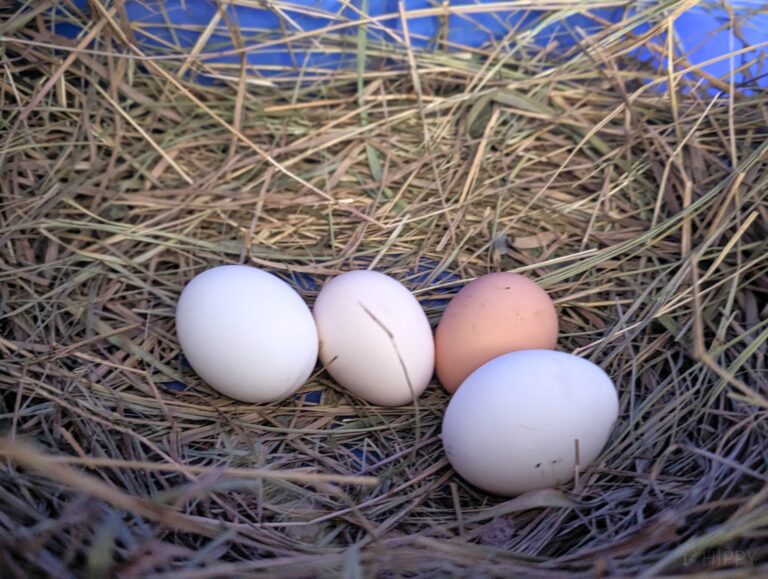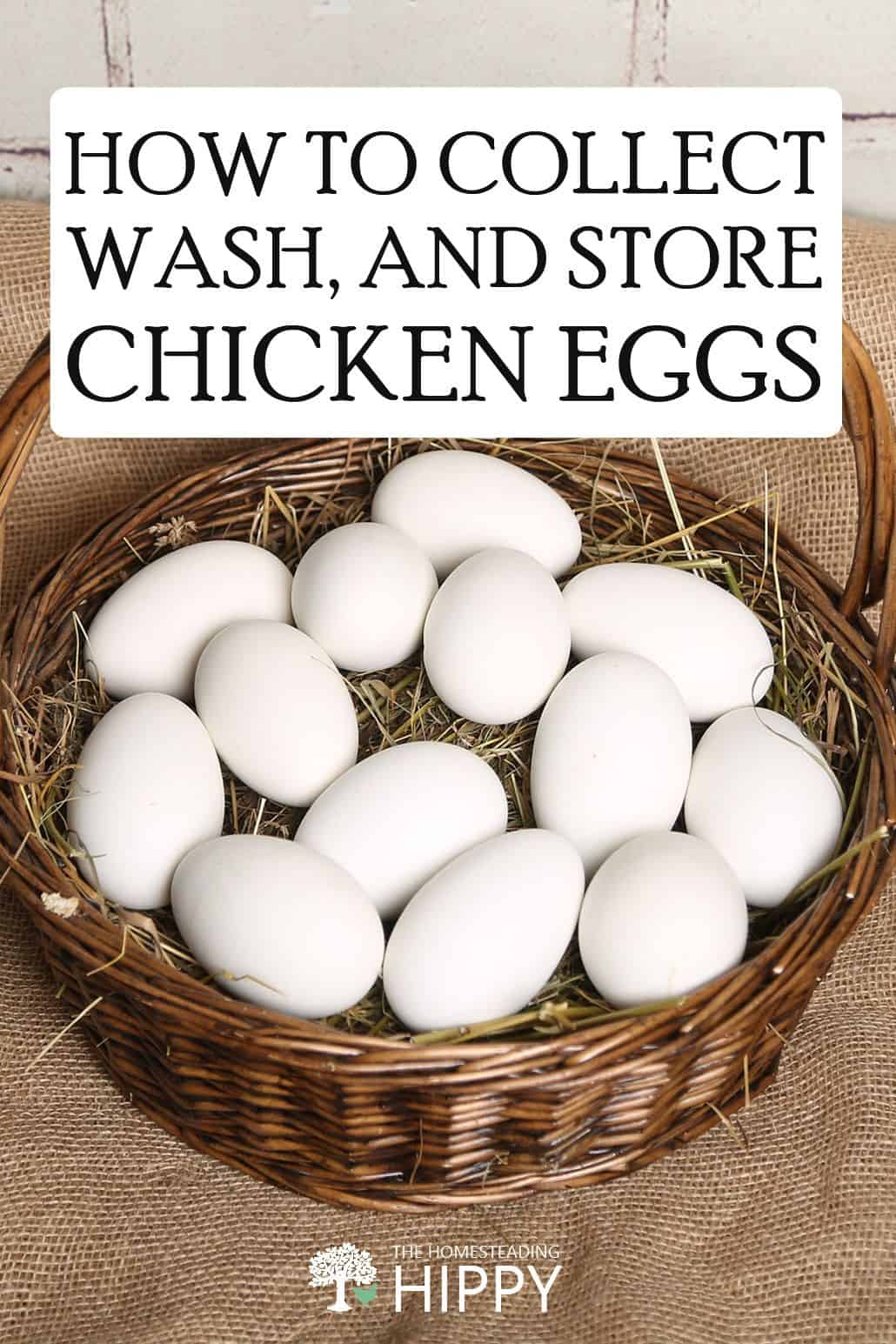Have you ever looked at a hen, and wondered if she misses her eggs when they are gone? The answer is simple: for chickens, laying eggs is something they do out of instinct. You will see a clear difference between a chicken who is just laying an egg, and a broody hen trying to hatch them.

A chicken laying an egg will lay it, and then wonder off. A broody chicken trying to hatch eggs will make a low rumbling noise rather than clucking, she will sit obsessively on her nest leaving only to eat and drink, and she will sit with her feathers all fluffed up.
Now that you know the difference, you need not feel bad about collecting your chicken’s eggs.
Fresh farm eggs are so much tastier than store bought eggs. With store-bought eggs you do not know when they were collected, the hygiene of the nests, the health of the chickens, or the process used to disinfect the eggs before they are sent to the store.
Ensuring that your eggs are collected, cleaned, and stored correctly, they will keep fresh and tasty for much longer.
Egg Collection Frequency
You should always inspect nests twice a day for eggs.
If you leave eggs in the nest too long, they run the risk of being cracked or broken by normal nest traffic. There is also a risk that you could start a very bad habit in the chicken run.
Chickens are opportunistic eaters. They experiment with whatever is available, and once one chicken stumbles onto something edible, they all join the fray. What is this habit I am talking about? Egg eating!
Yes, chickens eat eggs. If an egg breaks, you can be sure a chicken will find the tasty contents, and when the others see she is eating something, they will all dine with her.
The problem is that chickens are actually highly intelligent. They figure out very quickly that what they are eating is what was inside an egg, and they begin to break eggs as soon as they are laid to feast. They also have incredible memories, so they will continue this habit permanently when the opportunity arises.
Check your nests every morning and every evening for new eggs.
I also listen for my chickens during the day. A chicken who has just laid an egg will create such a raucous clucking you would think she just laid an egg! Oh wait, that is because she literally did just lay an egg. You can hear her pride at the achievement, so get out there and grab that egg before it gets broken.
The longer an egg is in the nest, the dirtier it will get.
Eggs that are left in nests are also likely to attract predators that will eat the eggs and possibly even the chickens too.
What should you do to collect the eggs?
First feed the chickens. They’re always eager for something delicious, and they will learn that your coming into their pen always means good things. They will quickly leave their nests to feed.
Always start with the nests that do not have chickens sitting on the eggs. As you move from nest to nest often the chickens on nests will get up and leave to follow their roomies to food.
If a chicken refuses to leave the nest, she is not necessarily broody. She may just not be hungry. Remember the signs of a broody chicken and make your decision.
Broody chickens are more territorial and protective of their eggs. You should take precautions by wearing long sleeve shirts and long pants in case she tries to bite you. Do you want more chickens?
Hens lay an average of one egg per day. If you find a nest with more than one egg, the hen may be broody. If you think she is broody, first lift her gently off her nest and make sure none of the eggs are broken or damaged.
If you do not want more chickens, take the eggs and gently set her back on the nest. She will soon go back to normal egg laying.
If you want more chicks, once you have checked the eggs for breakage, gently set her back down on her eggs. You will need to check her nest twice a day when you do your regular collections and immediately remove broken or damaged eggs.
Chickens incubation period is 20 to 21 days. If you see an egg around that time with a crack in it, do not remove it, it is probably just hatching.
In winter, you will need to collect eggs more often to prevent the eggs from freezing in the cold – although hens lay fewer eggs in winter.
In summer, eggs submitted to extreme heat will spoil very quickly. You will need to check the nests often, and get the eggs to a cool room to store them or keep them in the refrigerator.
Use a Clean Container
Most people will use a painted wire basket to collect eggs. They use painted baskets to avoid rust getting on the eggs as this is very hard to clean off.
I use a large plastic basin because it is going to serve multiple purposes in the process of collection and cleaning.
Never stack eggs more than five layers high, as you are increasing the risk of damaging and breaking them.
Washing Your Eggs
It is always better not to wash farm fresh eggs in water, as washing them will affect shelf life and storage. Try using a rough cloth to wipe the worst of the dirt off or use a sanding sponge, loofah, or abrasive sponge to clean feces off the shell.
If you find your eggs are very dirty every day, you should clean out all your nests and put fresh straw in them.
Unwashed, they do not need to be refrigerated and they will last up to a month on the counter.
You should wash your eggs before you use them to ensure that when you crack your eggs you do not introduce bacteria that was on the shell into your breakfast.
Keep the eggs at room temperature until you wash them. If you have cooled the eggs down and they are washed in warm water the shells will contract and dirt and bacteria may seep into the eggs via the shell contaminating the egg.
It is important that you clean the eggs as soon as possible if they are extremely dirty to limit the possibility of any bacteria seeping into the shell and contaminating the egg.
The water you are washing your eggs in should be 10 degrees warmer than the temperature of the egg. The warm water will force the egg to swell, and the dirt will be easier to remove.
If the egg is very dirty, you can add a little detergent to the water to clean off stubborn dirt.
Do not soak the eggs in water, as the shell will become porous letting in the bacteria. Put them in the water, wash them, and get them out before the egg and the water become the same temperature.
Use a dry dish towel to dry the eggs immediately, or let them air dry. Let the eggs cool down, but not in the fridge. Just a cool room will do.
Unwashed eggs do not need to be kept in the fridge; they can be stored on the counter or in the pantry for up to a month if the room temperature is 45°F / 7°C or lower. If the temperature is above 45°F / 7°C, they should be stored in the fridge.
Checking for Freshness – The Float Test
This is where my plastic tub serves its second purpose. I am going to check my eggs to make sure all the eggs are fresh. It is very easy to overlook one egg. It could be tucked into hay where you only find it weeks later when you move something.
By checking your eggs, you can determine which ones to use first, or whether an egg is off and should not be consumed.
First, candle the eggs to see if they are developing at all. If not, then you can try the float test.
As eggs age, the moisture inside evaporates and the air cell grows larger. So by putting the egg in a bowl of water, you can test to see if it is too old or if it is still fresh.
Simply pour water into the basin until the eggs have enough room to float comfortably.
You can use this float test to ensure you use the oldest eggs first – even store-bought eggs can be tested for freshness this way. Placing the eggs in water will mean you will have to store them in the fridge.
The float test scale of how fresh an egg is:
- The freshest eggs will always lay down on the bottom of the container
- Slightly older eggs (two or three weeks old) will stay on the bottom, but they will stand up
- The older but usable eggs will float but stay submerged in the water
- The higher the egg floats in the tub, the older it is – but these are still edible
- If the egg floats all the way to the surface, it is well past its best before date and should not be eaten
Now I know which eggs to discard, which to use first, and which can sit a while.
Storing Eggs
As I have already said, unwashed eggs don’t need to be stored in the refrigerator. Once an egg has been washed, it needs to be kept in the fridge and used as soon as possible. If you have washed your eggs and then refrigerated them, they will last up to two months.
If you don’t want to store eggs in the fridge, it is better to store them unwashed on the counter or in the pantry and wash them when you will be using them.
You can also store unwashed eggs in the refrigerator. Eggs stored in the refrigerator will last for two to three months.
When you collect eggs, put them in dated cartons. I use schoolbook labels that I write the date on and stick to the carton, and just paste a new label when I restock the carton.
You can also write the date an egg was collected onto the shell with a pencil to be sure of the age of the egg.
If you wash your eggs, they will need to be refrigerated at 32°F – 40°F (0°C to 5°C) on a shelf. Most fridges have a top shelf in the door of the fridge.
It’s better not to store your eggs there, as they will be jostled about every time the door is opened and they will be exposed to fluctuating temperatures that can lead to the eggs spoiling.
Whether your eggs have been washed or not, once an egg has been placed in the fridge it will have to stay in the fridge until use.
You cannot take eggs from the fridge and leave them on the counter. If they have been in the fridge, take them out only when you are ready to use them.
When you store your eggs, always do it with the air sac facing up. In other words, the round side should be on top and the pointy side should be on the bottom. This is to reduce the evaporation of moisture in the egg.
Conclusion
The sniff test is the test I find the most accurate in predicting if an egg is fresh enough to use. I say this very much with tongue in cheek.
Nothing is worse than cracking a rotten egg…
In my wild days – high school – my friends and I would sneak eggs from home and leave them hidden away where no one would find them for weeks.
Then we would toss them through the open boy’s room windows so that they broke and filled the room – often full of jocks showering – with the worst smell imaginable.
If you are planning to get chickens, do not be tempted into buying 50 of them! Not unless your family can eat 50 eggs a day, every day…


Di-Anne Devenish Seebregts was raised in an environment where daily life consisted of hiking, environmental conservation, growing fruit and vegetables, and raising poultry for meat and eggs.
She combined her passion for the writing word with her love of the pride that comes with not relying on others. She raised three children (who are now adults) to value the environment, and understand the value of being self-sufficient.
Find out more about Di-Anne on our About Us page.
